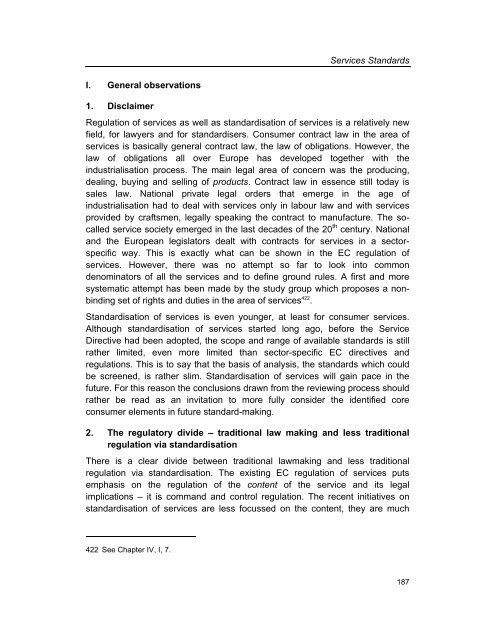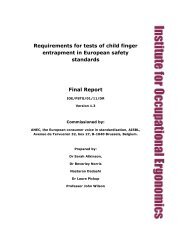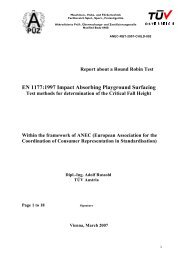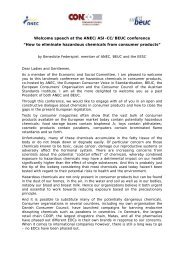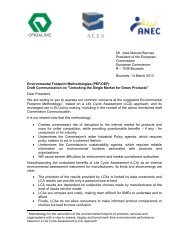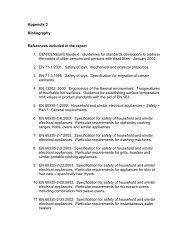Services Standards: Defining the Core Consumer Elements ... - ANEC
Services Standards: Defining the Core Consumer Elements ... - ANEC
Services Standards: Defining the Core Consumer Elements ... - ANEC
You also want an ePaper? Increase the reach of your titles
YUMPU automatically turns print PDFs into web optimized ePapers that Google loves.
<strong>Services</strong> <strong>Standards</strong><br />
I. General observations<br />
1. Disclaimer<br />
Regulation of services as well as standardisation of services is a relatively new<br />
field, for lawyers and for standardisers. <strong>Consumer</strong> contract law in <strong>the</strong> area of<br />
services is basically general contract law, <strong>the</strong> law of obligations. However, <strong>the</strong><br />
law of obligations all over Europe has developed toge<strong>the</strong>r with <strong>the</strong><br />
industrialisation process. The main legal area of concern was <strong>the</strong> producing,<br />
dealing, buying and selling of products. Contract law in essence still today is<br />
sales law. National private legal orders that emerge in <strong>the</strong> age of<br />
industrialisation had to deal with services only in labour law and with services<br />
provided by craftsmen, legally speaking <strong>the</strong> contract to manufacture. The socalled<br />
service society emerged in <strong>the</strong> last decades of <strong>the</strong> 20 th century. National<br />
and <strong>the</strong> European legislators dealt with contracts for services in a sectorspecific<br />
way. This is exactly what can be shown in <strong>the</strong> EC regulation of<br />
services. However, <strong>the</strong>re was no attempt so far to look into common<br />
denominators of all <strong>the</strong> services and to define ground rules. A first and more<br />
systematic attempt has been made by <strong>the</strong> study group which proposes a nonbinding<br />
set of rights and duties in <strong>the</strong> area of services 422 .<br />
Standardisation of services is even younger, at least for consumer services.<br />
Although standardisation of services started long ago, before <strong>the</strong> Service<br />
Directive had been adopted, <strong>the</strong> scope and range of available standards is still<br />
ra<strong>the</strong>r limited, even more limited than sector-specific EC directives and<br />
regulations. This is to say that <strong>the</strong> basis of analysis, <strong>the</strong> standards which could<br />
be screened, is ra<strong>the</strong>r slim. Standardisation of services will gain pace in <strong>the</strong><br />
future. For this reason <strong>the</strong> conclusions drawn from <strong>the</strong> reviewing process should<br />
ra<strong>the</strong>r be read as an invitation to more fully consider <strong>the</strong> identified core<br />
consumer elements in future standard-making.<br />
2. The regulatory divide – traditional law making and less traditional<br />
regulation via standardisation<br />
There is a clear divide between traditional lawmaking and less traditional<br />
regulation via standardisation. The existing EC regulation of services puts<br />
emphasis on <strong>the</strong> regulation of <strong>the</strong> content of <strong>the</strong> service and its legal<br />
implications – it is command and control regulation. The recent initiatives on<br />
standardisation of services are less focussed on <strong>the</strong> content, <strong>the</strong>y are much<br />
422 See Chapter IV, I, 7.<br />
187


